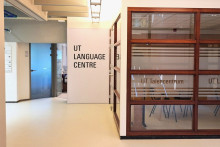Who are first generation students and why is it important to pay special attention to this group now?
Enklaar: ‘By first generation students we mean students who are the first in their family to study at a university. As the Inclusion Expert Group, which is part of the Shaping2030 mission, we are working on making everyone feel included at the UT. We were looking at groups that might have more difficulties adjusting to life at the university and we identified three main ones: people with disabilities, internationals and first generation students. This is a group most people won’t think of, but it is there.’
Why do these students struggle with adjusting to the university life?
‘I always tell a story I heard from a study advisor here at the UT years ago. It’s about a first generation student called Henk. Henk came from a small town in Drenthe, he was very intelligent but he had big problems explaining to his parents and friends back at home what he was doing at the university. They could not understand why he was here, why he was not just looking for a job. The university was all new to him and it was hard for him to connect with other students. He felt out of place and this led to study problems. I recalled this story when I was asked to join the expert group and realized we should do something to help students like Henk. I’m an expert on ethnic minorities and what makes some members of these minorities successful, while others not. I’ve discovered that social background makes a huge difference in this regard – and it is the same for first generation students. They struggle to adjust to the social world of a university.’
What kind of problems do they deal with?
‘Especially if you come from a working class family, your social circle has a very different lifestyle and values. It can be difficult to explain why you are not just learning a craft, why you are spending years studying. It is not always rewarded by their families. I had a friend whose mother was very proud of his brother, who was a plumber, but not of him, because he was an academic. Social origin can mean you feel less included at the UT. You might feel unsure and insecure despite your intelligence. You might feel ashamed of your social background and not proud of your study accomplishments. And that can be a barrier to become successful at the university.’
How many first generation students are there at the UT?
‘We actually have no idea. We are now looking for these students, we want to meet them and talk to them about their experiences, so that we can improve the situation for them. We are setting up interviews to hear their stories.’
Why wasn’t this issue addressed until now?
‘This issue is largely related to social background and talking of social background is a bit of a taboo in the Netherlands. We don’t like to talk of social classes, and so there hasn’t been much focus on it until now. However, now it is a hot topic. Many universities in the Netherlands and around the world are working to provide special support to first generation students.’
Do you already have ideas on how the UT could help these students?
‘We first want to talk to the students before we come up with specific guidelines, but yes we have some ideas. For example, it might be a nice idea to organize a special summer school for them or to hold sessions where students share their life stories, talk about their background. We could start a mentoring programme or dedicate a day at the Kick-In to this group. I would also very much like to start a network for them, connect them to other students, maybe have a buddy system. But perhaps we will come up with completely different ideas based on the interviews. As the expert group, we will deliver our recommendations to the Executive Board by the end of 2022. We definitely want to come up with practical solutions to make this group more comfortable at the UT.’







